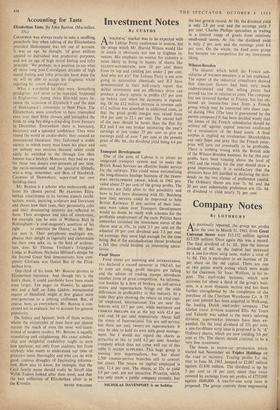Investment Notes
By CUSTOS
A 'POLITICAL' market was to be expected with the Labour Party conference in session, but the image which Mr. Harold Wilson would like to create is obviously not one to frighten in- vestors. His emphasis on science for industry is more likely to bring in buyers of shares like ELLIOTT-AUTOMATION, now 10 per cent down from its top and yielding just under 2 per cent. And why not xi? The Labour Party is not now going to nationalise chemicals and ICI have demonstrated in their half-yearly report that skilful investment and an efficiency drive can produce a sharp upturn in profits (17 per cent up before tax) when the economy is expand- ing. Of the £12 million increase in revenue only £1.2 million was absorbed in additional costs, so that the grosS profit margin was raised from 19.4 per cent to 22.1 per cent. The second half of the year should be better than the first for ICI and I see one broker estimating the year's earnings at just under 25 per cent to give an earnings yield of over 7 per cent at the present price of 68s. 6d.. the dividend yield being 4.4 per cent.
Transport Development
One of the aims of Labour is to create an integrated transport system and to make the British Road Services an effective feeder service for the railways. This could mean nationalising the long-distance haulage business of the TRANS- PORT DEVELOPMENT GROUP, Which in 1962 pro- vided about 25 per cent of the group profits. The directors are fully alive to this possibility and have in fact been discussing with Dr. Beeching how their services could be improved to help British Railways. If any section of their busi- ness were taken over Transport Development would no doubt be ready with schemes for the profitable employment of the cash. Politics have somewhat tarnished the investment status of the shares and at 15s., to yield 3.3 per cent on the adjusted 10 per cent dividend and 7.3 per cent on earnings, they seem high enough for the time being. But if the nationalisation threat produced a fall they could become an interesting specu- lation.
Food Stores
Food stores are booming and INTERNATIONAL TEA declared a record turnover in 1962-63, but its costs are rising, profit margins are falling and the advent of trading stamps introduces another form of price, competition. An informa- tive booklet by a firm of brokers on self-service stores and supermarkets brings out the wide differences in profitability in this industry. In a table they give showing the return on total capi- tal employed, International Tea are near the bottom with 13.7 per cent, while PRICERITE and CHARLES PHILLIPS are at the top with 42.4 per cent and 54 per cent respectively. About half the stores of International Tea are self-service, but there are only twenty-six supermarkets. It may be able to hold its own with good manage- ment, but I would not regard the shares as attractive at 16s. to yield 4.2 per cent. Another company which does not come well out of this table is ALLIED SUPPLIERS. This huge group is moving into Atperrnarkets, but has about 2,500 counter-service branches still to convert (or. close). The return on capital employed is only 12.4 per cent. The shares, at 32s. to yield 3.9 per cent, are not attractive. Pricerite, which was only made a public company recently, has the best growth record. At 18s. the dividend yield is only 2.8 per cent and the earnings yield 7 per cent. Charles Phillips specialises in trading in a limited range of goods from relatively small-sized stores. At I Is. the dividend yield is only 2 per cent and the earnings yield 8.4 per cent. On the whole, the food store group has become too competitive for my investment liking.
Wilmot-Breeden The disaster which befell the French sub- sidiaries of WILMOT-BREEDEN is at last explained. The report of the industrial consultants showed that time-cost factors had been very much underestimated and that selling prices had proved too low in relation to costs. The company has not invested further in France, but has ob- tained an interest-free loan from a French group which may be converted into share capi- tal during 1964. (The loan is guaranteed by the parent company.) It has been decided wisely that the losses of the French subsidiaries should be written off against capital reserves reinforced by a revaluation of the fixed assets. A final surplus is implied on revaluation. Shareholders can only hope and pray that the French enter- prise will oirn out eventually to be profitable. There is nothing wrong with the British side of the Wilmot-Breeden business. So far this year profits have been running above the level of 1962 and the results for the year should show a good improvement. It is satisfactory that the directors have felt justified in declaring the divi- dends on the two classes of preference capital. The Ordinary shares are now 7s. 9d. and the 20 per cent redeemable preference are I2s. 9d. ex dividend to yield nearly, 71 per cent.










































 Previous page
Previous page